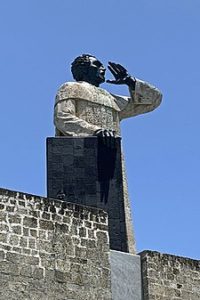Or:
How the Woke monster originated
In 1516, any lingering hopes that Ferdinand might prove to be the last emperor were put to rest by his death. He had not led a great crusade to reconquer Jerusalem; Islam had not been destroyed. Nevertheless, the achievements of Ferdinand’s reign had been formidable. His grandson, Charles, succeeded to the rule of the most powerful kingdom in Christendom, and to a sway more authentically globe-spanning than that of the Caesars. Spaniards felt no sense of inferiority when they compared their swelling empire to Rome’s. Quite the contrary. From lands unknown to the ancients came news of feats that would have done credit to Alexander: the toppling against all the odds of mighty kingdoms; the winning of dazzling fortunes; men who had come from nowhere to live like kings.
Yet there lay over the brilliance of these achievements a pall of anxiety. No people in antiquity would ever have succeeded in winning an empire for themselves had they doubted their licence to slaughter and enslave the vanquished; but Christians could not so readily be innocent in their cruelty. When scholars in Europe sought to justify the Spanish conquest of the New World, they reached not for the Church Fathers, but for Aristotle. ‘As the Philosopher says, it is clear that some men are slaves by nature and others free by nature.’ Even in the Indies, though, there were Spaniards who worried whether this was truly so. ‘Tell me,’ a Dominican demanded of his fellow settlers, eight years before Cortés took the road to Tenochtitlan, ‘by what right or justice do you keep these Indians in such a cruel and horrible servitude? On what authority have you waged a detestable war against these people, who dwelt quietly and peacefully in their own land?’

The Dominican Tom Holland alluded to above was Antonio de Montesinos, a Spanish missionary and friar. Together with the first community of Dominicans in the American continent, led by the vicar Fray Pedro de Córdoba, he distinguished himself in the defence of the Indians from the Spanish colonisers. He caused the conversion of Bartolomé de las Casas to the defence of the Indians, about whom I have written on this site more than one article.
When I considered myself a white nationalist and wrestled inwardly over which was the ultimate cause of Aryan decline, Judaism or Christianity, one of the factors that tipped the balance towards the latter was my father’s ideology. I wondered what caused him to go astray: the television he watched or his Catholic upbringing, which led to an exacerbated admiration for these Spanish friars. Eventually, I realised that it was the Christian religion that was the underlying factor in my father’s embrace of the Black Legend created by these friars.
Anyone interested in the details of this psychological analysis of my father and his admired friars can read El Grial. Holland continues:
Most of the friar’s congregation, too angered to reflect on his questions, contented themselves with issuing voluble complaints to the local governor, and agitating for his removal; but there were some colonists who did find their consciences pricked. Increasingly, adventurers in the New World had to reckon with condemnation of their exploits as cruelty, oppression, greed. Some, on occasion, might even come to this realisation themselves. The most dramatic example occurred in 1514, when a colonist in the West Indies had his life upended by a sudden, heart-stopping insight: that his enslavement of Indians was a mortal sin.
As always, the latent threat of eternal damnation is behind the great pathologies of the West.
Like Paul on the road to Damascus, like Augustine in the garden, Bartolomé de las Casas found himself born again. Freeing his slaves, he devoted himself from that moment on to defending the Indians from tyranny. Only the cause of bringing them to God, he argued, could possibly justify Spain’s rule of the New World; and only by means of persuasion might they legitimately be brought to God. ‘For they are our brothers, and Christ gave his life for them.’
Las Casas, whether on one side of the Atlantic, pleading his case at the royal court, or on the other, in straw-thatched colonial settlements, never doubted that his convictions derived from the mainstream of Christian teaching. [pages 307-308]
One reply on “Dominion, 18”
This brought up the master and slave mentality idea of Nietzsche that I recently say mentioned somewhere.
The master mentality can have a pang of humanist conscience that make him drop his rational appreciation of the danger of the slave group, the new King Charles III of Great Britain is an example who wants to be the known as the defender of the faiths of islam and judaism, or even more his son Prince Harry who are either ignorant or blatantly against their own nation and racial survival.